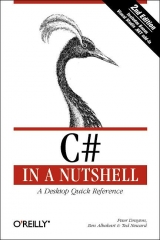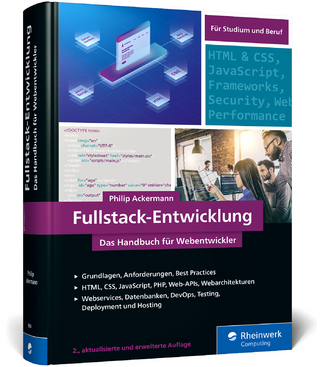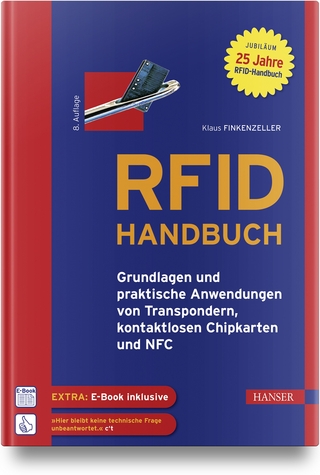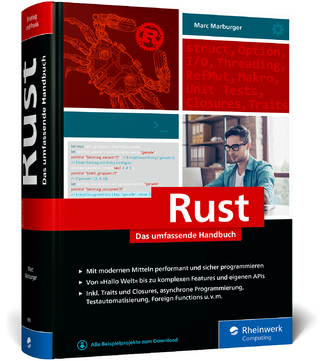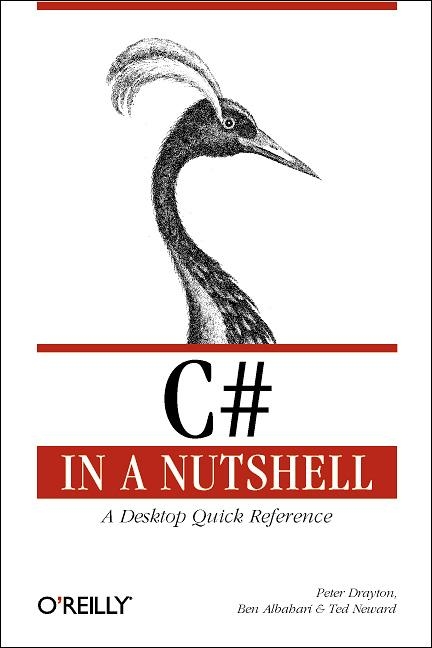
C# in a Nutshell
O'Reilly Media (Verlag)
978-0-596-00181-0 (ISBN)
- Titel erscheint in neuer Auflage
- Artikel merken
Next, an extensive and quick reference to the API is presented, featuring the System namespace. Figures and tables present the main features of the namespace. For those looking create alternatives to Microsoft's implementation of the C# Programming Language and the Common Language Infrastructure as submitted to ECMA (an international standards organization), each element included in the ECMA submission is labelled. Finally, the entire reference is based on Version 1 of the .NET Framework and generated by tools written in the C# language itself.
Peter Drayton is an independent consultant, helping early-stage companies define and build systems that take advantage of technologies such as .NET, SOAP, XML, and COM+. Peter is also an instructor for DevelopMentor, where he teaches Essential C SHARP.NET. Originally from Cape Town, South Africa, Peter now lives in the San Francisco Bay Area with his wife, Julie. He spends his spare time researching .NET and tinkering with a small flotilla of computers cluttering up their a partment. He can be reached at peter@razorsoft.com. Ben Albahari is cofounder of Genamics, a provider of tools for C SHARP and J++ programmers, as well as software for DNA and protein sequence analysis. He is author of A Comparative Overview of C SHARP, a frequently cited comparison of C SHARP with C/C++ and Java that was recently named by DevX as one of the top 10 .NET sites. Ben is a resident of Perth, Australia, and in his spare time enjoys composing music on his computer. He can be reached at ben@genamics.com.
Preface PART 1: Programming with C SHARP Chapter 1. Introducing C SHARP and the .NET Framework The C SHARP Language The .NET Framework ECMA Standardization Chapter 2. C SHARP Language Basics A First C SHARP Program Identifiers and Keywords Type Basics Value Types and Reference Types Predefined Types Arrays Variables and Parameters Expressions and Operators Statements Namespaces Chapter 3. Creating Types in C SHARP Classes Inheritance Access Modifiers Structs Interfaces Enums Chapter 4. Advanced C SHARP Features Delegates Delegates Versus Function Pointers Delegates Versus Interfaces Events Operator Overloading Try Statements and Exceptions Attributes Unsafe Code and Pointers Preprocessor Directives XML Documentation PART 2: Programming with the .NET Framework Chapter 5. Framework Class Library Overview Core Types Text Collections Streams and I/O Networking Threading Security Reflection and Metadata Assemblies Serialization Remoting Web Services Data Access XML Graphics Rich Client Applications Web-Based Applications Globalization Configuration Advanced Component Services Diagnostics and Debugging Interoperating with Unmanaged Code Compiler and Tool Support Runtime Facilities Native OS Facilities Undocumented Types Chapter 6. String Handling String Class StringBuilder Class Regular Expression Support Regular Expression Basics Procedural- and Expression-Based Patterns Cookbook Regular Expressions Chapter 7. Collections Iterating Over Collections Standard Collection Interfaces Predefined Collection Classes Ordering Instances Generating Hash Code Chapter 8. XML I/O Accessing XML Documents Parsing an XML Stream Selecting Nodes Using XPath Transforming a Document Using XSLT Chapter 9. Networking Network Programming Models Generic Request/Response Architecture HTTP-Specific Support WebClient Adding New Protocol Handlers Using TCP, UDP, and Sockets Using DNS Chapter 10. Streams and I/O Streams and Backing Stores Encapsulating Raw Streams Directories and Files Isolated Storage Chapter 11. Serialization What Is Serialization? Serialization Support in the Framework Explicit Serialization Implicit Serialization [Serializable] [NonSerialized] IDeserializationCallback ISerializable [Serializable] and ISerializable Chapter 12. Assemblies Elements of an Assembly Assemblies and Modules Scoping Types and Type References Naming and Signing Assemblies Resolving and Loading Assemblies Deployment Security Permissions Chapter 13. Reflection Type Hierarchy Types, Members, and Nested Types Retrieving the Type for an Instance Retrieving a Type Directly Reflecting Over a Type Hierarchy Late Binding Advanced Uses of Reflection Creating New Types at Runtime Chapter 14. Custom Attributes Language Support Compiler Support Runtime Support Predefined Attributes Defining a New Custom Attribute Retrieving a Custom Attribute at Runtime Chapter 15. Memory Management The Garbage Collector Optimization Techniques Finalizers Dispose and Close Methods Chapter 16. Threading Thread Synchronization Common Thread Types Asynchronous Delegates Chapter 17. Integrating with Native DLLs Calling Into DLLs Marshaling Common Types Marshaling Classes and Structs In and Out Marshaling Callbacks from Unmanaged Code Simulating a C Union Mapping a Struct to a Binary Format Predefined Interop Support Attributes Chapter 18. Integrating with COM Components Binding COM and C SHARP Objects Exposing COM Objects to C SHARP Exposing C SHARP Objects to COM COM Mapping in C SHARP Common COM Interop Support Attributes COM+ Support Chapter 19. Diagnostics Logging and Assertion Facilities Conditional Compilation Debugger Integration Processes, Threads, and Stacks Event Logs Performance Counters PART 3: Language and Tools Reference Chapter 20. C SHARP Language Reference Chapter 21. XML Documentation Tag Reference Chapter 22. C SHARP Naming and Coding Conventions Case Mechanics Word Choice Namespaces Chapter 23. C SHARP Development Tools PART 4: API Quick Reference Chapter 24. How to Use This Quick Reference Finding a Quick-Reference Entry Reading a Quick-Reference Entry Chapter 25. Microsoft.Win32 Chapter 26. System Chapter 27. System.Collections Chapter 28. System.Collections.Specialized Chapter 29. System.Diagnostics Chapter 30. System.Globalization Chapter 31. System.IO Chapter 32. System.IO.IsolatedStorage Chapter 33. System.Net Chapter 34. System.Net.Sockets Chapter 35. System.Reflection Chapter 36. System.Reflection.Emit Chapter 37. System.Runtime.InteropServices Chapter 38. System.Runtime.Serialization Chapter 39. System.Runtime.Serialization.Formatters Chapter 40. System.Text Chapter 41. System.Text.RegularExpressions Chapter 42. System.Threading Chapter 43. System.Timers Chapter 44. System.Xml Chapter 45. System.Xml.XPath Chapter 46. System.Xml.Xsl PART 5: Appendixes Appendix A. Regular Expressions Appendix B. Format Specifiers Appendix C. Data Marshaling Appendix D. C SHARP Keywords Appendix E. Namespaces and Assemblies Appendix F. Type, Method, Property, Event, Index
| Erscheint lt. Verlag | 9.4.2002 |
|---|---|
| Zusatzinfo | index |
| Verlagsort | Sebastopol |
| Sprache | englisch |
| Maße | 178 x 232 mm |
| Gewicht | 1014 g |
| Einbandart | kartoniert |
| Themenwelt | Mathematik / Informatik ► Informatik ► Programmiersprachen / -werkzeuge |
| ISBN-10 | 0-596-00181-9 / 0596001819 |
| ISBN-13 | 978-0-596-00181-0 / 9780596001810 |
| Zustand | Neuware |
| Haben Sie eine Frage zum Produkt? |
aus dem Bereich
